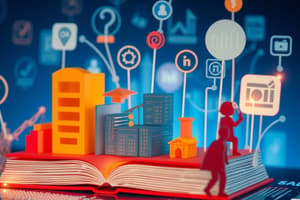Podcast
Questions and Answers
What is media literacy?
What is media literacy?
The ability to access, analyze, evaluate, and communicate information in various forms.
What can be considered as media?
What can be considered as media?
Physical objects used to communicate, such as radio, television, computers, telephone, mobile phone, film.
What does information literacy refer to?
What does information literacy refer to?
A set of abilities requiring individuals to recognize when information is needed and to locate, evaluate, and effectively use the needed information.
Media refers only to digital platforms.
Media refers only to digital platforms.
Which of the following is an example of non-verbal communication?
Which of the following is an example of non-verbal communication?
What is the definition of plagiarism?
What is the definition of plagiarism?
What is accuracy in the context of information literacy?
What is accuracy in the context of information literacy?
Which aspect helps improve communication in the present?
Which aspect helps improve communication in the present?
Information is a broad term that can cover data, knowledge derived from study, experience, or instruction, signals or _____ .
Information is a broad term that can cover data, knowledge derived from study, experience, or instruction, signals or _____ .
What can cause information overload?
What can cause information overload?
Flashcards are hidden until you start studying
Study Notes
Introduction to Media and Information Literacy
- Media literacy involves the ability to access, analyze, evaluate, and communicate information in various formats, both print and non-print.
- Information literacy encompasses the skills needed to recognize when information is necessary, and the ability to locate, evaluate, and effectively use that information.
Communication
- Communication is defined as using words, sounds, signs, or behaviors to express or exchange information, ideas, thoughts, and feelings.
- The communication process is critical for information transfer through various media (Shannon and Weaver model).
Media
- Media refers to the plural form of "medium," which can be seen as a means or instrument for communication.
- Mass media is a type of media specifically designed to reach large audiences, employing tools such as radio, television, and the internet.
Information
- Information is a broad term that includes data, knowledge gained from experience or instruction, and signals or symbols.
- In the media context, information is often related to specific events or situations communicated through news and other channels.
Information Literacy Empowerment
- Information literacy empowers individuals by enhancing their ability to filter useful information and reject what is not relevant.
- Actively processing information combats the tendency to passively accept everything encountered.
Types of Communication
- Channels of Communication:
- Verbal:
- Oral communication (spoken)
- Written communication (text)
- Non-verbal:
- Appearance, body language, sounds
- Verbal:
- Based on Purpose and Style:
- Formal communication (structured)
- Informal communication (casual)
Challenges in Information Management
- Overabundance of information can lead to confusion and the need for critical assessment skills.
- Techniques for organizing ideas include dependency on reliable sources and active filtering of information.
Plagiarism
- Plagiarism is the act of using someone else's ideas or words without credit, constituting literary theft.
- Understanding plagiarism is crucial in digital communication and academic work.
Security and Privacy
- Social media accounts often require personal information for registration, heightening risks of online theft.
- Online threats from hackers necessitate awareness and caution regarding information sharing.
Accuracy and Misinformation
- Misinformation can have significant harmful effects on individuals and society.
- The accuracy of information is paramount to ensure safety and well-being in the face of potential harm.
Studying That Suits You
Use AI to generate personalized quizzes and flashcards to suit your learning preferences.




